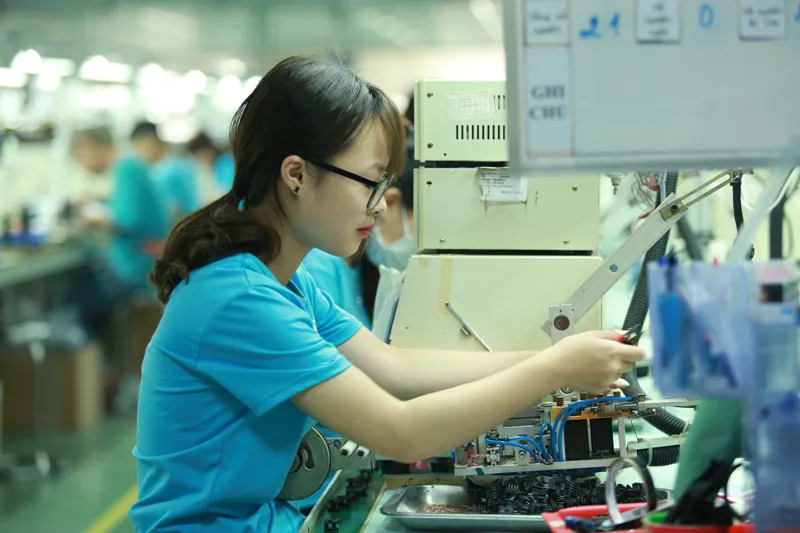Vietnam electronics exports dependent on foreign firms
Vietnam remains world’s 12th largest exporter of electronic products and the third in ASEAN.
While electronics make up a significant proportion in Vietnam’s total exports, up to 95% of the turnover of such products are in the hands of foreign-invested enterprises.
| Electronics production at Quang Minh industrial park in Me Linh district, Hanoi. Photo: Pham Hung |
The Department of Industry under the Ministry of Industry and Trade (MoIT) revealed the information in its report assessing Vietnam’s trade performance for the 2010-2019 period.
In the first three months of the year, foreign firms accounted for 99% of export revenue for phones and parts, and 98% for electronics, computers and associated components.
The report attributed such issue to the low localization rate in the electronics sector at 5-10%.
“The majority of electronic products in Vietnam are mainly imported or assembled domestically from parts made abroad,” stated the report.
While local enterprises in the supporting industries for electronics have gradually integrated into the sector’s value chain, they still mainly provide products with low technological contents and value, it added.
Meanwhile, major domestic electronic manufacturers only account for a small market share and are losing their brands.
“A number of local electronics brands have emerged, including BPhone, Vsmart or Viettel, but foreign peers continue to dominate the market,” stated the report.
Given the limited capabilities of domestic firms, product quality and appearance still fall short of market demands, while the linkage between local suppliers and multinationals in Vietnam remain weak, it added.
Nevertheless, the report noted local enterprises have shown strong efforts in enhancing their competitiveness and join foreign firms’ supply chains. For example, the number of Vietnamese companies qualified as Tier-1 suppliers for Samsung rose from four to 35 in four years. Four local firms are participating in the supply chains of Panasonic Vietnam, accounting for 10% of input materials, while Canon Vietnam is still actively seeking new suppliers to raise the localization rate.
To further support local electronics industry, the Department of Industry called for greater protection measures for the consumer electronics market against trade fraud, fake and smuggled goods; finalize legal framework for production and distribution of made-in-Vietnam products.
“Supporting policies are needed for potential domestic firms in electronics sector to become industry-leaders, especially in consumer electronic products,” the agency suggested.
“Local enterprises need to enhance competitiveness to ensure greater integration into global supply chains and better taking advantage of free trade agreements that the country is a part of, including the EVFTA,” it said.
In the 2010-2019 period, the export growth of Vietnam’s electronics averaged over 50%, with the turnover of US$87 billion in 2019. This puts Vietnam as world’s 12th largest exporter of electronic products and the third in ASEAN. Electronics was among a handful of sectors posting export turnover of over US$5 billion in the January-March period. Upon breaking down, exports of phones and parts rose by 9% year-on-year to US$14.1 billion, or 18% of total exports, while electronics, computers and associated parts surged by 31% to US$12 billion. |













